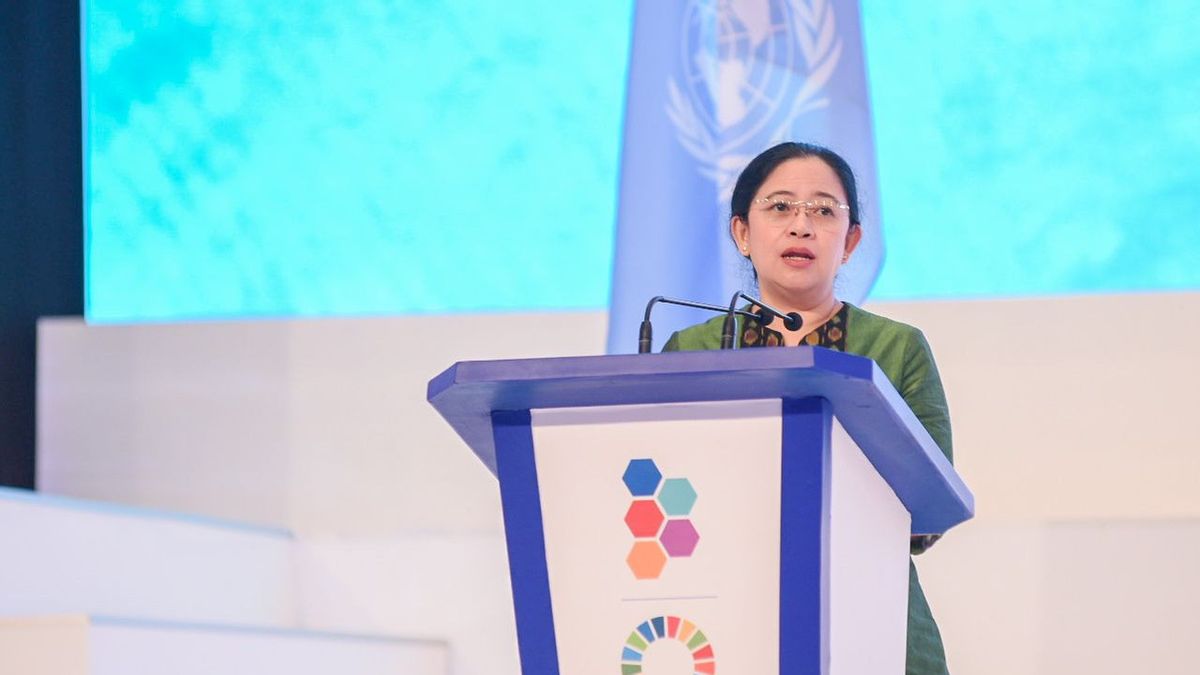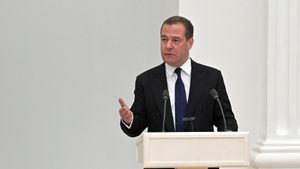JAKARTA - The Speaker of the House of Representatives, Puan Maharani, spoke at The 7th Global Platform for Disaster Risk Reduction (GPDRR) 2022 in Bali. At this UN disaster risk reduction forum, Puan emphasized the importance of the entire nation to take concrete actions to overcome disaster problems.
"This meeting is our joint effort in building commitment as citizens of the nation on this earth," said Puan at the event held at the Bali Nusa Dua Convention Center (BNDCC), Bali, Thursday, May 26.
Puan said that commitments between nations and countries have often been carried out in various forums, collaborations, and meetings.
"In fact, the commitment to advancing common interests and cooperation has been carried out since the Asian-African Conference in 1955," he recalled.
According to Puan, the COVID-19 pandemic has become a reminder of the importance of joint efforts and work in dealing with global problems. Joint efforts are needed in solving global problems such as food vulnerability, energy, clean water and sanitation, and nature conservation. "Global economic competition and industrial development have created gaps between countries in exploiting nature, utilizing exploitation technology and the course of development related to the environment," said Puan.
Puan also highlighted the gap in progress between countries. This, said Puan, makes countries in the world have different attitudes in exploiting nature as a source of state income. "Therefore, the theme of the GPDRR meeting is indeed very appropriate and relevant because the world needs to build people-centered disaster resilience," he said at the forum with the theme From Risk to Resilience: Towards Sustainable Development for All in a COVID-19 Transformed World. that.
According to Puan, people-centered disaster resilience begins with building awareness and commitment to preserving the sustainability and carrying capacity of nature and the environment. At the next stage, there is also a demand for a common will in building a world order of industrial ecosystems and an economy that is friendly to the environment.
"Since the Declaration of the Bandung Principles of 1955, which aspires to every nation to be independent and prosperous, until now there are still many cases of food shortages, clean water, environmental damage, environmental pollution, which are still found," explained Puan. “Therefore, it is necessary to change the way of thinking; a way of thinking that we do not only take from nature, but we must restore nature back to a good ecosystem,” added the former Coordinating Minister for Human Development and Culture.
On the other hand, Puan stated that parliament is also increasingly aware of its strategic role in strengthening international cooperation between parliaments for climate change adaptation and mitigation. He emphasized that this issue has become one of the common concerns among others in the Inter Parliamentary Union (IPU), which is a forum for parliaments of world countries. "As the President of the 144th IPU Assembly in Bali, 20-24 March 2022, I have led the approval of the Nusa Dua Declaration related to climate change adaptation and mitigation efforts," said Puan.
In the Nusa Dua Declaration, world parliaments affirm their commitment to strengthening national action to realize global commitments, namely achieving net zero emissions. In addition, explained Puan, support for climate finance for developing countries amounted to US$ 100 billion which must be fulfilled immediately. "At the regional level, the ASEAN Inter Parliamentary Assembly (AIPA) also encourages cooperation to realize the ASEAN Vision 2025 on Disaster Management," he said.
Puan stated that realistic and real forms of cooperation between nations and countries are needed to be able to touch the core issues. The core problem in question is managing global economic competition and industry that can contribute to environmental recovery.
“Where the industry does not only take from nature but also must be able to restore its recovery. This is a recovery program that is carried out systematically and massively,” said Puan.
Furthermore, the grandson of the Proclaimer of the Republic of Indonesia, Bung Karno, said that parliament is in a unique position in disaster management as a catalyst for policy making, bridging the interests of various parties, and representing constituents. Puan said that through the function of parliament, various political strengthening could be carried out. "Such as strengthening development policies that pay attention to the carrying capacity of the environment, supporting disaster management policies that can involve the participation of all parties: the government, the general public, and industry," he explained. "To provide a legal basis for managing environmentally sound development and disaster management, and to provide an adequate budget for risk reduction and increasing community resilience to disasters," continued Puan.
Not only that, various efforts at the international level on disaster risk reduction must be accompanied by strengthening the country's internal foundations. According to Puan, the country's internal foundations need to be directed towards building food sovereignty, environmentally friendly industries, optimizing new and renewable energy, as well as building resilience in the face of disasters. "Implementation of the three transformative agendas, namely the Sendai Framework on Disaster Risk Reduction (SFDRR), SDGs and the Paris Agreement at the national and global levels, requires consistency, synergy and coordination at all levels," he explained. "The need for multi-stakeholder involvement is becoming increasingly prominent: DRR is every one business," added Puan.
Puan also emphasized that the DPR RI is ready to move together with the parliaments of other countries to strengthen its role in disaster risk reduction. Moreover, the challenges ahead will not be easier. "Now is the time to act without delay," said Puan.
Therefore, Puan believes and believes that this conference will be able to produce the right formulation that can be implemented in strengthening resilience in the face of disasters and sustainable development, in accordance with the 2022 GPDRR targets. “The formulation of joint commitments is important, but concrete actions, no matter how small, It becomes even more important for us to get closer to achieving sustainable development,” said Puan. "With solid cooperation and concrete actions at the national and international levels, the transformative goals of the SFDRR, SDGs and the Paris Agreement will be achieved in accordance with what we all hoped for," he continued. Present at this event were the President of the 76th Session of the UN General Assembly (President of the UN General Assembly) Abdulla Shahid and the UN Secretary General's Special Envoy for Disaster Risk Reduction Mami Mizutori.
The GPDRR 2022 event itself aims to increase efforts through communication and coordination between stakeholders such as the government, United Nations international organizations and institutions, NGOs, scientists or academics, and private sector actors where Indonesia is hosting the 7th meeting.
Through the GPDRR, stakeholders are expected to share experiences in formulating strategic guidelines for the implementation of the global framework for DRR (disaster risk reduction) or the Sendai Framework for DRR (disaster risk reduction) 2015-2030.
The English, Chinese, Japanese, Arabic, and French versions are automatically generated by the AI. So there may still be inaccuracies in translating, please always see Indonesian as our main language. (system supported by DigitalSiber.id)








